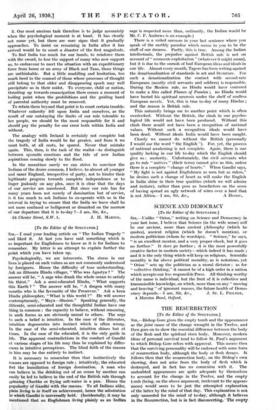[To the Editor of the SPECTATOR.] SIR,—I read your leading
article on "The Indian Tragedy" and liked it. At last you have said something which is as important for Englishmen to know as it is for Indians to remember. My letter is an attempt to explain furthet the point which you have taken up, Psychologically, we are introverts. The stress in our lives is placed on such values as are not commonly understood by foreigners. Hence the difficulty of true understanding. Ask an illiterate Hindu villager, " Who was Agastya ? " The answer will be, " A sage who drank the whole ocean to satisfy his thirst." Ask a semi-educated Hindu, " What supports this Earth ? " The answer will be, " A dragon with many mouths who is the favourite of the Preserver." Ask a keen Hindu philosopher, "What is this world ?" He will answer contemptuously, " Maya—illusion." Speaking generally, the illiterate, semi-educated and the thoughtful Indian have one thing in common : the capacity to believe, without reasoning, in such forces as are obviously unreal to others. The urge to such a belief- is intuition. In the case of the illiterates, intuition degenerates into instinct which is often wrong. In the case of the semi-educated, intuition shines but at times. In the case of the educated, it is the only guide in life. The apparent contradictions in the conduct of Gandhi at various stages of his life may thus be explained by differ- ences in intuitive perceptions. The blind faith of the masses in him may be due entirely to instinct.
It is necessary to remember then that instinctively the masses are opposed to foreign rule -; intuitively, the educated feel the humiliation of foreign domination. A man who can believe in the drinking out of an ocean by another can easily be led to believe in the end of the British rule through spinning Charkha or frying salt-water in a pan. Hence the popularity of Gandhi with the masses.- To all Indians alike, plain living is in itself an achievement, hence the admiration in which Gandhi is universally held. - (Incidentally, it may be mentioned that an Englishman living plainly as an Indian-
sage is respected more than, ordinarily, the Indian would be Mr. C. F. Andrews is an example.)
There is a veiled sarcasm in your last sentence where you speak of the earthly paradise which seems to you to be the stuff of our dreams. Partly, this is true. Among the Indian intellectuals, the prejudice against British rule is not on account of " economic exploitation " (whatever it might mean), but it is due to the onrush of bad European ideas and ideals in our life. Almost every month, Tagore has been writing against the denationalization of standards in art and literature. For such a denationalization the contact with second-rate Europeans (mostly civil servants and soldiers) is responsible. During the Moslem rule, no Hindu would have ventured to make a film called Flames. of Passion ; no Hindu would have buried his spiritual neurosis under the shelf of soulless European novels. Yet, this is true to-day of many Hindus ; and the _reason is British rule.
This naturally brings me to another point which is often overlooked. Without the British, the clash -in our psycho- logical life would not have been produced. Without this clash there would not have been a recognition of national values. Without such ,a recognition ideals would have been dead. Without ideals India would have been naught.
Clearly we cannot do without the British (personally I would use the word " the English "). For, yet, the process of national awakening is not complete. Again, there is one quality lacking in our life to-day which the English should give us : austerity. Unfortunately, the civil servants who go to rule " natives " (their term) cannot give us this, unless there is a complete " change of hearts." When Gandhi says, " My fight is not against Englishmen as men but as rulers," he desires such a change of heart as will make the English in India shine in their true qualities (which we will admire and imitate), rather than pose as benefactors on the score of having spread an ugly network of wires over a land that
is not Africa.—I am, Sir, &c., A HINDU.




































 Previous page
Previous page